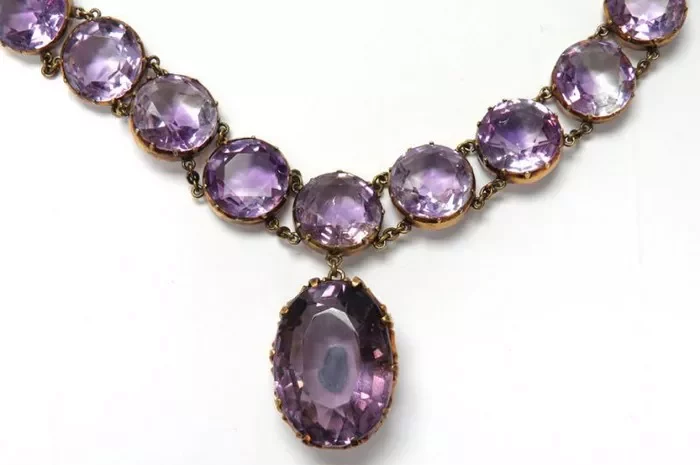Amethyst is a beautiful and popular gemstone known for its stunning purple color and various metaphysical properties. It has been cherished for centuries for its beauty and believed healing properties. However, while many people benefit from wearing amethyst, there are certain individuals who may not be suitable candidates for wearing this gemstone. In this article, we will explore who should not wear amethyst stone and the reasons behind it, providing insights into the potential risks and considerations associated with wearing this gemstone.
Understanding Amethyst
Amethyst is a variety of quartz crystal known for its striking purple color, ranging from pale lilac to deep violet. The color of amethyst is due to the presence of trace amounts of iron within the crystal structure. It is found in various locations around the world, including Brazil, Uruguay, Zambia, and Russia.
Amethyst has been revered for its metaphysical properties and is believed to have a range of healing benefits. It is often associated with properties such as protection, spiritual growth, and emotional balance. Many people wear amethyst jewelry or keep amethyst crystals in their living spaces to harness its positive energies.
Who Should Not Wear Amethyst Stone
While amethyst is generally considered safe for most people to wear, there are certain individuals who may not be suitable candidates for wearing this gemstone. Here are some groups of people who should exercise caution or avoid wearing amethyst altogether:
Pregnant Women: Pregnant women are often advised to avoid wearing certain gemstones, including amethyst, during pregnancy. While there is no conclusive evidence to suggest that wearing amethyst is harmful during pregnancy, some people believe that certain gemstones may have energetic properties that could potentially affect the developing fetus. It is always best for pregnant women to consult with their healthcare provider before wearing any gemstone jewelry.
Individuals with Allergies: Some people may be allergic to certain metals used in jewelry settings, such as nickel or copper, which can cause skin irritation or allergic reactions. While amethyst itself is not known to cause allergic reactions, individuals with metal allergies should be cautious when wearing amethyst jewelry to avoid potential skin irritation.
People with Certain Medical Conditions: Individuals with certain medical conditions, such as epilepsy, heart disease, or high blood pressure, may need to exercise caution when wearing amethyst or other gemstones. Some people believe that amethyst has calming and soothing properties that can help alleviate symptoms of stress and anxiety. However, if you have a medical condition or are taking medication, it’s important to consult with your healthcare provider before using any alternative or complementary therapies, including gemstone therapy.
Children: While children may be drawn to the vibrant colors of amethyst, it’s important to exercise caution when allowing them to wear gemstone jewelry. Children may not have the maturity or awareness to understand the potential risks associated with wearing certain gemstones, such as choking hazards or skin irritation. It’s best to supervise children when they are wearing jewelry and choose age-appropriate pieces made with safe materials.
People with Negative Associations: Some individuals may have negative associations or experiences with certain gemstones, including amethyst, due to cultural beliefs, superstitions, or personal experiences. If wearing amethyst evokes negative feelings or emotions for you, it may be best to avoid wearing it altogether and choose a different gemstone that resonates better with your energy and intentions.
Potential Risks of Wearing Amethyst
While amethyst is generally considered safe for most people to wear, there are some potential risks and considerations to be aware of:
Choking Hazard: Small amethyst crystals or beads used in jewelry settings can pose a choking hazard, especially for young children. It’s important to keep jewelry containing small gemstones out of reach of young children and supervise them when they are wearing jewelry.
Skin Irritation: While amethyst itself is not known to cause skin irritation, the metal used in jewelry settings, such as nickel or copper, can cause allergic reactions in some individuals. If you experience any skin irritation or allergic reactions while wearing amethyst jewelry, discontinue use and consult with a dermatologist.
Energetic Sensitivity: Some people may be highly sensitive to the energetic properties of gemstones, including amethyst, and may experience feelings of discomfort or imbalance when wearing certain gemstones. It’s important to listen to your body and intuition and choose gemstones that resonate positively with your energy and intentions.
Conclusion
While amethyst is a beautiful and popular gemstone with many positive metaphysical properties, there are certain individuals who may not be suitable candidates for wearing this gemstone. Pregnant women, individuals with allergies, people with certain medical conditions, children, and those with negative associations with amethyst should exercise caution or avoid wearing amethyst altogether. It’s important to listen to your body and intuition and choose gemstones that resonate positively with your energy and intentions. If you have any concerns or questions about wearing amethyst or other gemstones, consult with a qualified healthcare provider or gemstone therapist for personalized guidance and advice.


